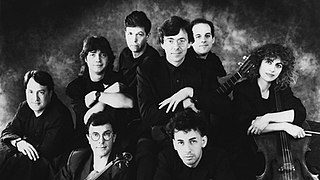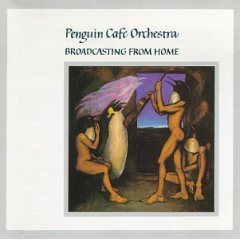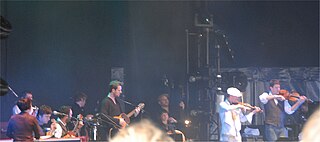
The Penguin Cafe Orchestra (PCO) were an avant-pop band led by English guitarist Simon Jeffes. Co-founded with cellist Helen Liebmann, the band toured extensively during the 1980s and 1990s. The band's sound is not easily categorized, having elements of exuberant folk music and a minimalist aesthetic occasionally reminiscent of composers such as Philip Glass.
Mario Davidovsky was an Argentine-American composer. Born in Argentina, he emigrated in 1960 to the United States, where he lived for the remainder of his life. He is best known for his series of compositions called Synchronisms, which in live performance incorporate both acoustic instruments and electroacoustic sounds played from a tape.

Penguin Cafe Orchestra is the second studio album by the Penguin Cafe Orchestra, released in 1981, and recorded between 1977 and 1980. By this album, the line-up for the band had expanded greatly, with contribution including Simon Jeffes, Helen Leibmann, Steve Nye, Gavyn Wright of the original quartet, as well as Geoff Richardson, Peter Veitch, Braco, Giles Leamna, Julio Segovia and Neil Rennie. All pieces were composed by Simon Jeffes except for "Paul's Dance", "Cutting Branches" (traditional), and "Walk Don't Run". The cover painting is by Emily Young.

Music from the Penguin Cafe is the first studio album by the Penguin Cafe Orchestra. It was recorded between 1974 and 1976, and released in 1976.

Broadcasting from Home is the third studio album by the Penguin Cafe Orchestra, released in 1984 on E.G. Records. The opening song was named after PCO leader Simon Jeffes found a discarded harmonium in an alleyway in Japan.

When in Rome... is a 1988 live album by the Penguin Cafe Orchestra, and was recorded at The Royal Festival Hall, London, on 9 July 1987. It was produced by Simon Jeffes and published by E.G. Records. The cover painting is by Emily Young.
David Horne is a Scottish composer, pianist, and teacher.

Signs of Life is the fourth studio album by the Penguin Cafe Orchestra. It was recorded at the Penguin Cafe between 1985 and 1987 and released in March 1987. It includes "Perpetuum Mobile", one of their most famous pieces. The album reached number 49 in the UK Albums Chart.

Penguin Cafe is a band originally conceived by Arthur Jeffes, son of Simon Jeffes and Emily Young, as a continuation of his father's project, the Penguin Cafe Orchestra. The group is distinct from the original Penguin Cafe Orchestra, despite the similarities in genre, name, and even repertoire There are no members of the original PCO in Penguin Cafe.
William Jay Sydeman was a prolific American composer. He was born in New York. He studied at Duke University, and received a B.S. degree in 1955 from the Mannes School of Music, having studied with Felix Salzer, Roy Travis, and Roger Sessions. He received his master's in music from the Hartt School in 1958, studying under Arnold Franchetti and Goffredo Petrassi. From 1959 to 1970 he joined the composition faculty at his alma mater Mannes School of Music.
Gary Alan Kulesha is a Canadian composer, pianist, conductor, and educator. Since 1995, he has been Composer Advisor to the Toronto Symphony Orchestra. He has been Composer-in-Residence with the Kitchener-Waterloo Symphony (1988–1992) and the Canadian Opera Company (1993–1995). He was awarded the National Arts Centre Orchestra Composer Award in 2002.

The trumpet repertoire consists of solo literature and orchestral or, more commonly, band parts written for the trumpet. Tracings its origins to 1500 BC, the trumpet is a musical instrument with the highest register in the brass family.
Alexander Mikhailovich Raskatov is a Russian composer.

Roger Bourland is an American composer, publisher, blogger, and Professor-Emeritus of Music at the UCLA Herb Alpert School of Music.
Tatjana Kozlova-Johannes is an Estonian-Russian composer.









